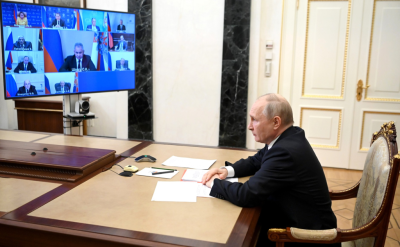Putin’s Strategic Blunder

All Global Research articles can be read in 51 languages by activating the Translate Website button below the author’s name (only available in desktop version).
To receive Global Research’s Daily Newsletter (selected articles), click here.
Click the share button above to email/forward this article to your friends and colleagues. Follow us on Instagram and Twitter and subscribe to our Telegram Channel. Feel free to repost and share widely Global Research articles.
Global Research Wants to Hear From You!
***
The blunder began years before February 2022. Putin failed to realize that the US was preparing the overthrow of the Ukraine government. When the overthrow began, Putin took no action to prevent the overthrow. Instead, Russia permitted Washington to take over the former province of the Russian state.
A hostile Ukraine is an existential threat to Russia.
Why did Russia stand aside and permit Washington’s takeover?
Why did Russia sit for the next eight years on its hands, rejecting the votes of the independent Donbas republics to be reunited with Russia from which they were torn by Soviet leaders and stuck in Ukraine?
The culprit in these strategic blunders was the Kremlin’s lack of realism.
Putin relied on diplomacy despite the fact that Washington relies on threats, bribes, and coercion. The Kremlin simply did not understand that with the Minsk Agreement it was saddling a dead horse that could go nowhere.
When Putin was finally forced to intervene by the prospect that the inhabitants of Russian Donbas were about to be slaughtered like Palestinians in Gaza today, Putin failed to respond decisively. Still playing all by himself a diplomatic game, he insisted that there be no Russian invasion of Ukraine, only a “special military operation” to clear hostile Ukrainian forces from Donbas.
Lost in a diplomatic world that no longer exists, Putin failed to realize that regardless of what he said or did, Western propaganda would present the intervention as a reconstruction of the Soviet Empire that would extend to all of Europe.
It was immediately obvious that the limited and slow-paced “special military operation” would provide Washington and its NATO puppets abundant time to become involved in the conflict, thus endlessly widening the conflict until the conflict became an existential issue for Russia. This is what has occurred.
Still the Kremlin thinks unrealistically. Putin is on the verge of succeeding with his purpose of driving Ukrainian forces out of, and away from, the Russian populated areas, and the assumption is that the war will be over and Russia’s success will be acknowledged in a negotiated settlement.
This delusion persists despite Russian Foreign Minister Lavrov’s acknowledgement that Washington intends Russia’s destruction. Both Lavrov and Putin continue to stress that they are willing to negotiate with Washington Washington’s intention to destroy Russia. It would be hilarious if were not so deadly.
Listen to Lavrov’s speech. He understands the threat to Russia but is incapable of matching a Russian response to the threat.
Thinking Russia’s intervention to be limited, Putin was unprepared for war. He has done very little to hamper the Ukrainian government’s ability to conduct war. Rather than shutting down Ukraine, Putin chose a long drawn-out village by village conquest. The West interpreted this as limited Russian military capability, and this provided both encouragement and time for the West to involve itself in the conflict.
The West is so involved now and the Western political leaders are so certain that Russia intends more aggression that they are preparing for war against Russia. Still, Putin and Lavrov speak of negotiation. After a decade of the West’s rejection of negotiation, how can the Kremlin still see negotiation as a solution?
What needed to be done was to knock Kiev out of the war, install a Russian friendly government in place of the American puppet regime, and present the West with a fait accompli before the West had time to get involved. It is Western involvement that presents the danger of the conflict widening into a war between Russia and the West.
Possibly the solution is still viable. It would leave a neutral Ukrainian state west of the Dnieper River with no Black Sea access. It is highly unlikely that such an outcome can be achieved by negotiation. It can only be imposed by force.
By restraining Russia’s use of force, Putin has opened the road to nuclear Armageddon?
*
Note to readers: Please click the share button above. Follow us on Instagram and Twitter and subscribe to our Telegram Channel. Feel free to repost and share widely Global Research articles.
Paul Craig Roberts is a renowned author and academic, chairman of The Institute for Political Economy where this article was originally published. Dr. Roberts was previously associate editor and columnist for The Wall Street Journal. He was Assistant Secretary of the Treasury for Economic Policy during the Reagan Administration. He is a regular contributor to Global Research.
Featured image source

